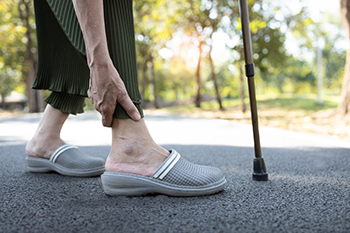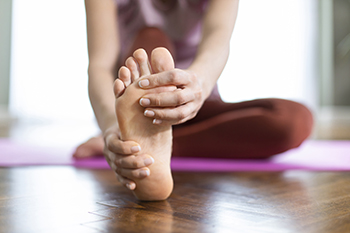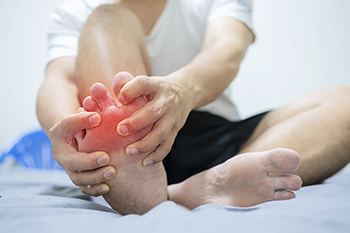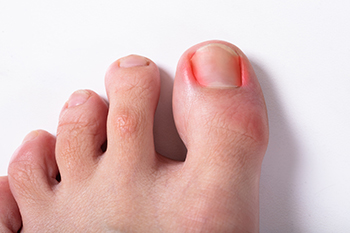Connect With Us
Blog
Items filtered by date: June 2025
How Aging Affects Your Feet

As we age, the feet naturally undergo changes that can affect comfort, mobility, and overall health. Common changes include thickened or discolored toenails, joint stiffness, thinning skin, and reduced fat padding on the soles. Circulation may also decline, leading to cooler feet or changes in color, such as bluish or reddish tones. These changes can make walking more difficult and increase the risk of falls or injury. Joint stiffness may indicate arthritis, while numbness or tingling could be a sign of nerve issues or diabetes. Thickened toenails and dry skin can also make self-care harder and lead to infections. A podiatrist can evaluate these symptoms with a physical exam, medical history, and diagnostic tests to identify underlying conditions. Treatment may include custom orthotics, targeted exercises, nail care, or recommendations for supportive footwear. If you are noticing changes in your feet, it is suggested that you make an appointment with a podiatrist for evaluation and treatment.
If you need your feet checked, contact Deann Hofer Ogilvie, DPM of Ascend Foot & Ankle Center. Our practitioner will attend to all of your foot and ankle needs and provide you with quality treatment.
Geriatrics and Podiatry
When people age, some common issues that may occur are bone density loss, dry skin, poor circulation, and rough brittle nails. These issues may also affect your foot health if the necessary steps are not taken to alleviate the problems.
It is important to take care of your feet because feet that are injured or diseased can affect your overall health. Having painful feet hinders your ability to do daily activities or may decrease your willingness to do the things that you need to do.
Visiting Your Geriatrician
As we age, health problems become more likely, so it is essential to visit your doctor for check-ups to ensure that you are doing the best you can to take care of your health. It is recommended to check your feet frequently for any possible cuts, bruises, swelling, corns or any other irregularities.
Taking Care of Elderly Feet
Cracked or dry feet can be treated by applying moisturizer often. It is also important not to wear old socks because the older the sock is, the higher the possibility there will be that there is bacteria there. Wear fresh socks and make sure they fit properly.
Proper foot health means that you can have a more active lifestyle and you will not be bogged down by pain. Foot health also leads to good circulation, which is paramount for overall health.
If you have any questions, please feel free to contact our office located in Lafayette, CO . We offer the newest diagnostic tools and technology to treat your foot and ankle needs.
Caring for Sore and Tired Toes

Persistent toe discomfort can make even simple movements difficult. Wearing tight shoes, repetitive pressure, or underlying joint issues often lead to pain, swelling, or stiffness in the toes. Gently stretching the feet and choosing footwear with enough room for your toes can reduce irritation. Padding or silicone toe separators may ease friction and support natural alignment. Conditions such as hammertoes, arthritis, or nerve irritation may also be involved and require more specific care. Early attention helps prevent worsening of symptoms. If pain does not improve or begins to affect how you walk, it is suggested that you see a podiatrist for a complete evaluation and personalized treatment.
Toe pain can disrupt your daily activities. If you have any concerns, contact Deann Hofer Ogilvie, DPM of Ascend Foot & Ankle Center. Our practitioner can provide the care you need to keep you pain-free and on your feet.
What Causes Toe Pain?
Most severe toe pain is caused due to a sports injury, trauma from dropping something heavy on the toe, or bumping into something rigid. Other problems can develop over time for various reasons.
Toe pain can be caused by one or more ailments. The most common include:
- Trauma
- Sports injury
- Wearing shoes that are too tight
- Arthritis
- Gout
- Corns and calluses
- Hammertoe
- Bunions
- Blisters
- Ingrown toenails
- Sprains
- Fractures (broken bones)
- Dislocations
When to See a Podiatrist
- Severe pain
- Persistent pain that lasts more than a week
- Signs of infection
- Continued swelling
- Pain that prevents walking
Diagnosis
In many cases the cause of toe pain is obvious, but in others, a podiatrist may want to use more advanced methods to determine the problem. These can range from simple visual inspections and sensation tests to X-rays and MRI scans. Prior medical history, family medical history, and any recent physical traumatic events will all be taken into consideration for a proper diagnosis.
Treatment
Treatments for toe pain and injuries vary and may include shoe inserts, padding, taping, medicines, injections, and in some cases, surgery. If you believe that you have broken a toe, please see a podiatrist as soon as possible.
If you have any questions please feel free to contact our office located in Lafayette, CO . We offer the newest diagnostic tools and technology to treat your foot and ankle needs.
What to Know About Pseudogout and Foot Pain

Pseudogout is a joint condition that can cause sudden pain and swelling in the feet and ankles. It occurs when calcium pyrophosphate crystals collect in the joints, leading to inflammation that can feel similar to gout. While both conditions involve crystal buildup, gout is caused by uric acid crystals and often targets the big toe, whereas pseudogout typically affects the ankle or midfoot and involves different minerals. The pain from pseudogout may come on quickly and can limit movement, making walking difficult. It tends to affect older adults, especially those with osteoarthritis or joint trauma. Diagnosis often requires imaging and lab tests to confirm the type of crystals present. Treatment for pseudogout include anti-inflammatory medication, joint aspiration, and lifestyle changes to reduce flare-ups and manage symptoms. If foot or ankle pain appears without warning and does not improve, it is suggested that you visit a podiatrist for proper evaluation and treatment.
Arthritis can be a difficult condition to live with. If you are seeking treatment, contact Deann Hofer Ogilvie, DPM from Ascend Foot & Ankle Center. Our practitioner can provide the care you need to keep you pain-free and on your feet.
Arthritic Foot Care
Arthritis is a joint disorder that involves the inflammation of different joints in your body, such as those in your feet. Arthritis is often caused by a degenerative joint disease and causes mild to severe pain in all affected areas. In addition to this, swelling and stiffness in the affected joints can also be a common symptom of arthritis.
In many cases, wearing ill-fitting shoes can worsen the effects and pain of arthritis. Wearing shoes that have a lower heel and extra room can help your feet feel more comfortable. In cases of rheumatoid arthritis, the arch in your foot may become problematic. Buying shoes with proper arch support that contour to your feet can help immensely.
Alleviating Arthritic Pain
- Exercises that stretch the foot can prevent further pain and injury and increase mobility
- Most of the pain can be alleviated with anti-inflammatory drugs, heat, and topical medications
- Massages can help temporarily alleviate pain.
It is best to see your doctor for the treatment that is right for your needs and symptoms. Conditions vary, and a podiatrist can help you determine the right method of care for your feet.
If you have any questions, please feel free to contact our office located in Lafayette, CO . We offer the newest diagnostic tools and technology to treat your foot and ankle needs.
Understanding the Winograd Procedure

The Winograd procedure is a common surgical approach used to treat chronic or severe ingrown toenails that do not respond to conservative care. This minimally invasive technique involves removing a portion of the affected toenail along with the underlying nail matrix to prevent regrowth in that area. It is typically performed under local anesthesia and is considered a safe and effective solution for recurring pain and infection. Patients can usually walk immediately after the procedure, although some discomfort and drainage may occur during the initial healing period. Proper aftercare, including keeping the area clean and avoiding pressure on the toe, helps reduce the risk of complications. If you experience ongoing problems with an ingrown toenail despite home treatments, or if the nail becomes repeatedly infected, it is suggested that you see a podiatrist for a diagnosis and treatment plan that may include the Winograd procedure.
Ingrown toenails can become painful if they are not treated properly. For more information about ingrown toenails, contact Deann Hofer Ogilvie, DPM of Ascend Foot & Ankle Center. Our practitioner can provide the care you need to keep you pain-free and on your feet.
Ingrown Toenails
Ingrown toenails occur when a toenail grows sideways into the bed of the nail, causing pain, swelling, and possibly infection.
Causes
- Bacterial infections
- Improper nail cutting such as cutting it too short or not straight across
- Trauma to the toe, such as stubbing, which causes the nail to grow back irregularly
- Ill-fitting shoes that bunch the toes too close together
- Genetic predisposition
Prevention
Because ingrown toenails are not something found outside of shoe-wearing cultures, going barefoot as often as possible will decrease the likeliness of developing ingrown toenails. Wearing proper fitting shoes and using proper cutting techniques will also help decrease your risk of developing ingrown toenails.
Treatment
Ingrown toenails are a very treatable foot condition. In minor cases, soaking the affected area in salt or antibacterial soaps will not only help with the ingrown nail itself, but also help prevent any infections from occurring. In more severe cases, surgery is an option. In either case, speaking to your podiatrist about this condition will help you get a better understanding of specific treatment options that are right for you.
If you have any questions please feel free to contact our office located in Lafayette, CO . We offer the newest diagnostic and treatment technologies for all your foot and ankle needs.
